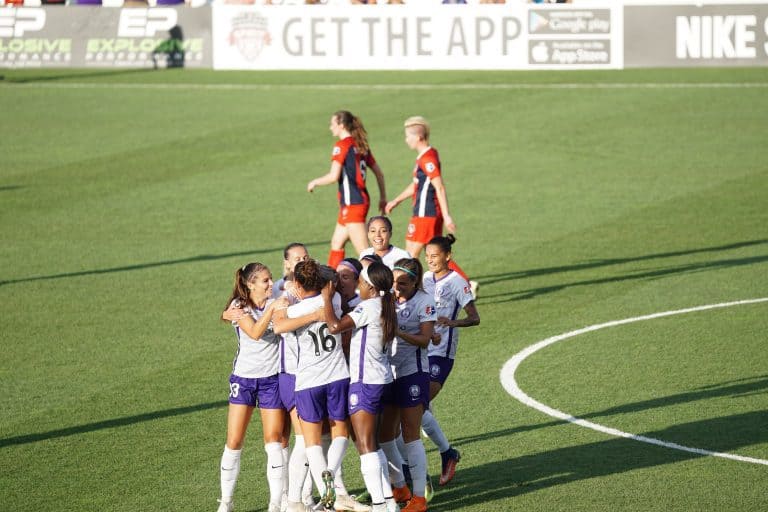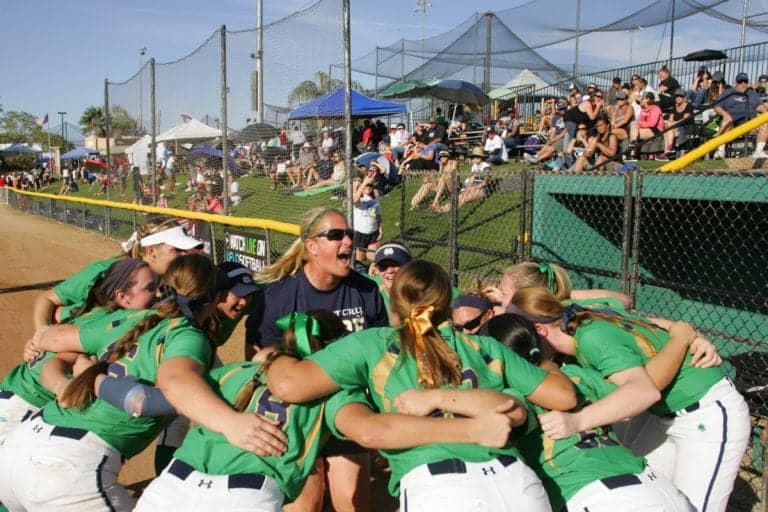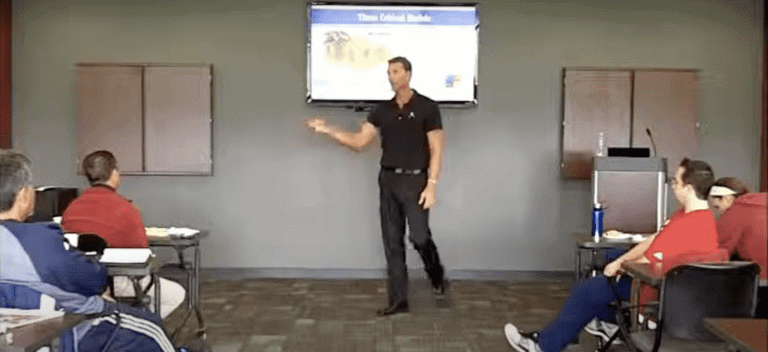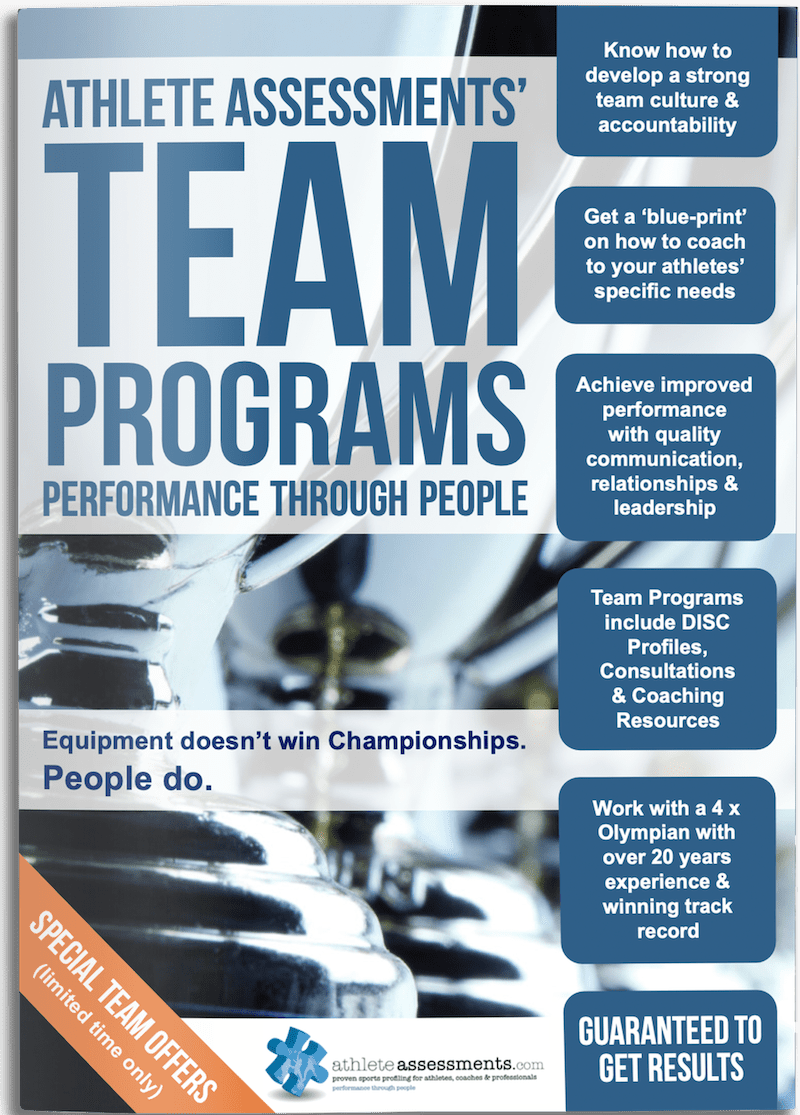When a notification from Head Coach of Notre Dame Softball, Deanna Gumpf, popped up on our Twitter sharing their team’s DISC inspired bake off, it would be an understatement to say that the team at Athlete Assessments had our week made.
DISC challenge @CoachBoHanson @AthleteAssess impressive cakes. The bakers are more impressive!! 🍀🍀🍀 https://t.co/cbTXc0uLmU
— Deanna Gumpf (@NDcoachGumpf) January 15, 2023
We knew we immediately had to know more, so we chatted to Deanna and her coaching team to get the play by play. Deanna’s powerhouse coaching team is comprised of Associate Head Coach, Kris Ganeff; Associate Coach, Amanda Eberhart; Volunteer Assistant Coach, Mackenzie Swinehart; and Softball Operations Specialist, Jamie Spitale. Reflecting on the activity they shared how it began,
“We only told the players that they were going to have a DISC activity, and after our skill practice concluded we told them what group they were in, before then telling them that we would be doing a cake bake.”
“We grouped our athletes based on their Natural DISC Behavior, having to make some adjustments to our Dominance ‘D’ group in order for it to not just be one person, including other players that had over 50% D in their profile. Our ‘D’ group was made up of 4 players. Our ‘I’ group was made up of 5 players. Our ‘S’ group was made up of 7 players. Finally, the ‘C’ group was made up of 6 players. Once grouped, they then drew out of a hat the name of a Coach, which would be whose house they would be going to bake their cakes.”
After the groups had been assigned their baking location, the next step for them was to meet Coach Jamie at a grocery store, where they had 20 minutes to pick the items they wanted to make and decorate their cakes.
The coaches shared that this is where the observations about their behavioral style began,
“The ‘S’ group met at the door of the grocery store to compile their list of ingredients and what they as a group wanted to make. While they were standing at the door contemplating and going back and forth, the ‘I’ group blew past them and went straight to the bakery aisle. While these two groups were in the grocery store, the D’s and C’s decided to come back to our stadium to change clothes and were taking their sweet time!”
“The first group to finish shopping were the S’s, because they purchased every possible item they might use in abundance, they had enough ingredients to complete 4 cakes and to decorate them as well. The next group to check out were the I’s who shared with us that they stood in the aisle, would grab something, get excited, and change their minds and get excited again. They also got distracted by the fact that they were near snacks and drinks, so they purchased those as well. Their focus shifted back to the task after they decided on which cake they were making.”
The coaches continued,
“Next came the C’s, before shopping the group had already been onto Pinterest and decided on what they wanted and what they needed. They had a complete plan and thus they spent the least amount of time in the store and spent the least amount of money, they also called Coach Kris to pre-heat their oven after leaving the store to ensure it would be perfectly heated upon arrival. The last group to leave the store and arrive at their Coach’s house was the D’s. They did not want to make a cake from a box, in fact it never crossed their mind to not make something from scratch, including the icing and the decorations, everything had to be made by them.”
All teams had to wait until the D’s arrived at Coach Riv’s house, but once they did all groups received a text that allowed them to begin baking.
Athlete Assessments has been fortunate enough to work with Deanna’s team for over a decade, joined by our shared passion for getting the best out of our people through improved communication and relationships. Founder and Director of Athlete Assessments, Bo Hanson, shared his perspective on the challenge,
“Activities like this take effort to plan, so firstly well done to Deanna and the Notre Dame Softball coaches and staff for believing in the value of experience-based activities. There is no better way to see someone’s most natural behaviors than a task which draws the focus away from thinking about how I should behave and simply just participating.”
Deanna shared that for the challenge they were given just one rule to follow, “They had to be back at our stadium by 6:00 pm with their completed product.”
The coaches shared the following observations of each group:
Dominance – D’s – They wanted to win in all areas. They wanted it to be the best tasting, best decorating, and best icing, but no one took the lead. The only trait of their ‘D’ was the need to win. But they were so slow, the fastest thing they did was to cool the cakes outside in the cold weather by running around with them. We think it was because we only had 1 true D mixed in with some I’s. They were the last team to arrive at the stadium.
Influence – I’s – They were mostly concerned about eating snacks and playing Mario Kart. The group cheated and started before they were supposed to, but then they were having so much fun they forgot about their cake in the oven and it was burnt and dry! They also started first but got to the stadium late as they were distracted by fun and group time!
Steadiness – S’s – They would not start the oven or do anything until they got the okay to begin, and throughout they would constantly ask each other questions to reassure them on what they were doing. As a group they decided to make cupcakes since they knew they would cool the fastest and they would not be late in arriving back to the stadium. In fact, they were so worried about being late and their product being ruined that they decided to bring everything to our stadium to frost and decorate.
Conscientious – C’s – They followed everything to a ‘T’, to the point that they would not use dry measuring cups for a wet ingredient and only do one step at a time to make sure it was accurate. During the in-oven downtime – they would eat snacks and socialize, but they didn’t get distracted. They had the timer set and would check it to stay on track. The coaches were worried they were not going to make it on time, but when it was time for each step they got it done. This group had the most questions right off the bat, needing detailed information before they constructed and followed through with their plan. Their process was so thought through that they even had time to empty the clean dishwasher and load their dirty dishes in before leaving early and arriving on time at the stadium. Their cake was the winner.
The coaches shared that while the team was grouped into their respective primary DISC styles, the activity really reinforced that behaviors are adaptable in different situations. For example, within each group they could see some individuals adapting to a ‘D’ or bringing another behavior that group needed, and that even their final products showcased the different behavior styles.
The coaches added, “The I’s made a really fun and loud cake. The C’s were creative, detailed, and stuck perfectly to their plan, the S’s had harmony and made something that was for the group, and the D’s made a delicious, made from scratch cake, and even put Big D Energy on it!”
While the team’s challenge was engaging and light-hearted, and rivaled the entertainment seen on The Great British Bakeoff, it was also a demonstration of how understanding the behaviors and motivations of others is applicable in any area of life. At Athlete Assessments, we love seeing initiatives like this as we feel the greatest value of DISC comes from the conversations and application that happens after the initial profiling, as Bo described,
“After the activity of baking cakes and decorating, it is really impactful to reflect on what each team did and how they went about the task to showcase the similarities and differences between the styles. Then, eventually linking what this looks like back to sport can be the most effective way of helping to learn about your self and others.”
To conclude, the coaching team shared their own highlight,
“The best part was bringing them all together and hearing how this can be representative to our team on the field. The number one takeaway they all said was how we need everyone and all the behavior styles for our team to be the very best we can be.”
Where to from here?
If like Deanna and the Notre Dame Softball team, you would like to incorporate Athlete Assessments DISC Profiles into your team or program to develop self-awareness, build better communication and relationships across your athletes and coaches, and better understand the dynamics that create your unique team identity, find out more about our Elite Team Program.
Built off the framework DISC provides, our Team Program is designed to provide valuable yet sustainable development for your team to understand themselves and others and empowers your coaches and athletes to develop more effective relationships with the people around them. Learn more by reaching out to contact us!
Recommended Articles
Creating and maintaining an effective team culture is critical to sustained success. So, if we define culture simply as ‘the way we behave around here’, we need to determine what is acceptable and what is not? But then as a coach, how do you sustain a culture or how do you deal with an athlete who acts in a way that opposes the culture you want?
The University of Notre Dame Softball Coaching Staff are diverse and they are unique. Not only have they played together, they now coach alongside each other begging the question, what more could you learn from someone you have known so well for so long?
In this video clip, Bo Hanson discusses the difference between coaches having their natural coaching styles and their adaptive coaching styles. He covers how coaches can utilize sport coach adaptability and adapt their behaviors to coach to the needs of the individual athletes, based on their DISC Style.









